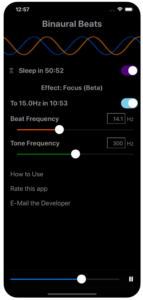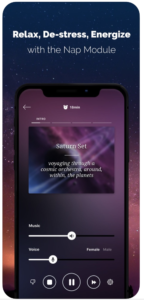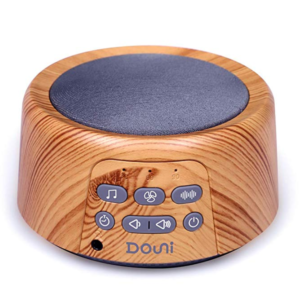Note: Sleep music and sounds are not something that I use regularly for helping me sleep. It’s very low priority for me as I don’t find it necessary and I also don’t want to develop a dependency on white noise for sleep. However I will use music or binaural if I’m in a place where there is a lot of external noise like a party or street noise.
Every year, approximately one in four Americans experience acute insomnia, which is a condition that involves struggling to fall and stay asleep at least three nights per week for two or more weeks in a row. [1]
Additionally, while some people are able to overcome this issue and find better sleep again, roughly 21 percent are not. Even worse, for 6 percent, their insomnia turns chronic, meaning that it lasts longer than three months.
Other common sleep disorders include snoring, sleep apnea, restless leg syndrome, and narcolepsy. [2] But why are these such a problem, other than the obvious impact of leaving us feeling tired all of the time?
Why Sleep Problems Are Such an Issue
The National Sleep Foundation shares that the reasons sleep problems are so troubling are many, but a few of the most notable include:
- Difficulty focusing, negatively impacting your performance and productivity;
- Slowed reaction time, which can be deadly when you’re driving or engaged in other tasks that require a faster response;
- Reduced creativity, leading to poorer problem-solving skills; and
- Trouble remembering, since sleep is when our memories are transferred from the short-term to the long-term storage part of our brains. [3]
In the end, sleep quality can affect many areas of our lives, which is why it’s so important to find ways to get a restful night’s sleep.
Step One: Discover the Cause
The first step in solving your individual sleep problem is to figure out its cause.
In some cases, experiencing higher levels of stress or anxiety, having a disease, being in pain, or just having poor sleep habits may be to blame. Other times, a certain medication that you’re taking may be an issue, with some of the biggest culprits being meds designed to treat colds, allergies, high blood pressure, heart disease, and thyroid disease. Even birth control pills can make it more difficult to sleep. [4]
How do you get better sleep if you’re experiencing some of these issues? Instead of reaching for a sleep aid—which research has found can potentially be habit-forming and increase daytime drowsiness [5]—two effective non-drug options involve sleep music and sleep sounds.
Let’s look at some of each, as well as which ones may be best for helping you sleep well once again.
Best Music for Sleep
While some people use music to help get their heart rate going and wake up, others find that certain tunes can also lull you into a deep sleep, helping you feel more refreshed and energetic the following day.
What is some of the best music for falling and staying asleep?
Classical Music
Research has found that classical music is great sleep music. For example, one study involving 94 students who had previously complained about poor sleep found that listening to relaxing classical music for 45 minutes before bedtime reduced their sleep-related issues. [6]
The National Sleep Foundation explains that classical sleep music works by directly impacting your parasympathetic nervous system, helping it relax and get ready for sleep. [7] It also lowers your heart rate and blood pressure, which is beneficial whether you’re just napping or looking to spend a complete night in dreamland.
Spotify offers already-created playlists of classical music designed to help you fall into a deep, relaxing sleep. “Relax With the Classics” is one and includes relaxing melodies from some of the greatest composers of all time, such as Mozart, Beethoven, and more. [8]
Another option is to simply create your own classical playlist, which you can do using iTunes, Amazon Music, or whatever site you typically use to download your favorite tunes.
Binaural Beats
 Binaural beats are actually a type of soundwave therapy designed to reduce feelings of anxiety and stress (both of which can keep you awake). [9] It works by inputting relaxing melodies in different frequencies in each ear, ultimately altering your brain-wave activity.
Binaural beats are actually a type of soundwave therapy designed to reduce feelings of anxiety and stress (both of which can keep you awake). [9] It works by inputting relaxing melodies in different frequencies in each ear, ultimately altering your brain-wave activity.
Because each ear has to hear these different frequencies—each of which is less than 1000 Hz and cannot differ by more than 30 Hz—binaural beats do require the use of headphones. [10]
If you have an iPhone, you can download the Binaural Beats app for free. It is rated 4.7 stars and offers the ability to set your own base tone and see animated waves in real time. [11]
The Binaural Beats Podcast is also available to iPhone users and provides access to six different podcasts, whether your goal is to calm your brain enough to doze off, but also if you’d like to wake it up. [12] So, you can use this sleep music podcast to start your day as well, which may sound more appealing than using an alarm clock, especially if you’re the type of person who likes to repeatedly hit the snooze button.
Android users have highly-rated binaural beat app options as well, such as Binaural Beats Therapy, which is rated 4.5 stars by more than 14,000 users and provides presets so you can choose whether you want to use it to get better sleep, or if you’d like to improve your focus, learn faster, or have better creativity. [13]
Pzizz
 Pzizz is in a category all its own because this sleep music app combines the soothing sounds of certain types of music layered with soothing voices which are input at specific intervals so it is tailored to your actual sleep cycle. [14]
Pzizz is in a category all its own because this sleep music app combines the soothing sounds of certain types of music layered with soothing voices which are input at specific intervals so it is tailored to your actual sleep cycle. [14]
Not only has Pzizz been rated five stars, but it also has great reviews from well-known names like J.K. Rowling (author of the Harry Potter series), Daniel Weinard (co-founder of Spotify), and Roy Hibbert (National Basketball Association player).
You can download this app to either your iPhone or Android for free for seven days, after which you must subscribe to continue using its service.
We rate Pzizz at 5 stars.
Best Sleep Sounds
Maybe you’d prefer to listen to relaxing sounds before dropping off to sleep? In that case, you have a couple of different options for getting a better night’s rest. Most fall into one of two categories: white noise and nature sounds.
White Noise
The reason white noise machines help with better sleep is because they block out background noises such as human voices, passing traffic, or any other sounds that may make it harder to fall and stay asleep.
Or, as the National Sleep Foundation puts it, white noise works by “creating a constant ambient sound” that masks any activity that may be occurring both in and out of your home. [15]
One simple way to implement white noise is to turn on a fan in the corner of your room. You can also purchase a white noise machine that creates a constant static type of sound, drowning out all of the other noises around you.
If you do a quick search on Amazon, you’ll find that some of the highest-rated white noise machines on the market today are Hatch Baby Rest Sound Machine (which you can control from your Android or iPhone), Adaptive Sound Technologies LectroFan High Fidelity White Noise Sound Machine, and Douni Sleep Sound Machine. [16]
Nature Sounds
Do you notice that you tend to sleep better when surrounded by nature? If so, there are also machines you can buy that will fill your bedroom with these soothing sounds.

The Douni Sleep Sound Machine is Amazon’s choice pick in this category, offering users access to relaxing ocean waves and water sounds, as well as other nature sounds such as crickets, thunder, a campfire, and even lullabies. [17] This particular sound machine also enables you to set a timer for 30, 60, or 90 minutes, and you can also use headphones if you don’t want to disturb anyone else in the room.
You can also download a nature sounds app on your iPhone or Android, giving you access to the great outdoors even when you’re not at home. Some of the highest-rated insomnia apps that offer nature sounds include Nature Sounds Relax and Sleep, Sleepo, and Sleep Sounds. [18]
Get Your Best Sleep Possible
If your goal is to get your best sleep possible, sleep music and sleep sounds can help. Some require the purchase of actual electronic devices, while others can be downloaded directly to your Android or iPhone so you can access them anywhere.
This gives you a lot of options depending on your own personal style and taste. It also provides more alternatives to try if you’re not currently getting the amount of peaceful rest you’d like.
Try one or try them all. If the research is right, you’re in for your best sleep yet.
